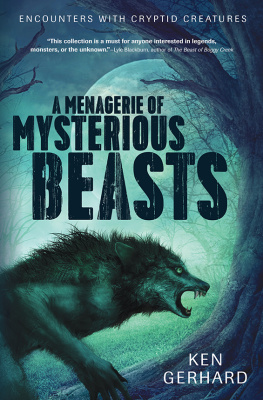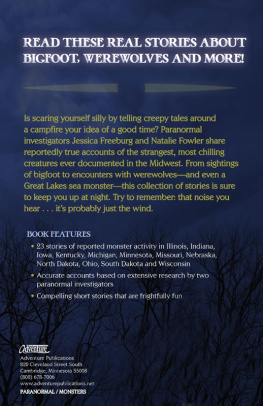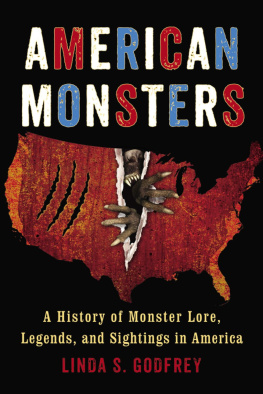Ken Gerhard (San Antonio, TX) is a widely recognized cryptozoologist. He has traveled around the world searching for evidence of mysterious animals, including Bigfoot, the Loch Ness Monster, the Chupacabra, flying creatures, and even werewolves. Ken has authored three books on the unexplained, and his research has been featured on the History Channel, Travel Channel, Syfy, National Geographic, A&E, truTV, Nat Geo Wild, Science Channel, and Destination America. He is a regular guest on Coast to Coast AM .

Llewellyn Publications
Woodbury, Minnesota
Copyright Information
A Menagerie of Mysterious Beasts: Encounters with Cryptid Creatures 2016 by Ken Gerhard.
All rights reserved. No part of this book may be used or reproduced in any matter whatsoever, including Internet usage, without written permission from Llewellyn Publications, except in the form of brief quotations embodied in critical articles and reviews.
As the purchaser of this e-book, you are granted the non-exclusive, non-transferable right to access and read the text of this e-book on screen. The text may not be otherwise reproduced, transmitted, downloaded, or recorded on any other storage device in any form or by any means.
Any unauthorized usage of the text without express written permission of the publisher is a violation of the authors copyright and is illegal and punishable by law.
First e-book edition 2016
E-book ISBN: 9780738749273
Library of Congress Cataloging-in-Publication Data
Names: Gerhard, Ken, author.
Title: A menagerie of mysterious beasts : encounters with cryptid creatures
/ Ken Gerhard.
Description: First edition. | Woodbury, Minnesota : Llewellyn Publications,
2016. | Includes bibliographical references.
Identifiers: LCCN 2016020032 (print) | LCCN 2016032295 (ebook) | ISBN
9780738746661 | ISBN 9780738749273
Subjects: LCSH: Animals, Mythical. | Monsters.
Classification: LCC GR820 .G47 2016 (print) | LCC GR820 (ebook) | DDC
001.944dc23
LC record available at https://lccn.loc.gov/2016020032
Llewellyn Publications is an imprint of Llewellyn Worldwide Ltd.
Llewellyn Publications does not participate in, endorse, or have any authority or responsibility concerning private business arrangements between our authors and the public.
Any Internet references contained in this work are current at publication time, but the publisher cannot guarantee that a specific reference will continue or be maintained. Please refer to the publishers website for links to current author websites.
Llewellyn Publications
Llewellyn Worldwide Ltd.
2143 Wooddale Drive
Woodbury, MN 55125
www.llewellyn.com
Manufactured in the United States of America
Contents
The Minnesota Iceman: A Chinese Ape-Man?
Ape-Men in the Americas
Werewolves and Other Cryptid Carnivores
Sea Monsters
Enormous Eagles
Modern Dragons
Massive Amphibians
Creepy-Crawlies
Phantoms, Fairies, and Mermaids
Introduction
In past centuries, persons of nobility would maintain and ex hibit awe-inspiring collections of rare and exotic animals, which had been gathered from faraway lands. The ostentatious displays were often regarded as shows of great wealth and influence, but they also served another important purpose. In a world that seemed dark and mysterious, these bestiaries would enthrall and fascinate curious observers, reminding them that remote corners of the planet still harbored fabulous beasts that they could scarcely imagine.
Charlemagne, the mighty emperor of Western Europe, was among the first to possess such a menagerie during the Middle Ages. In 802 CE the caliph of Baghdad presented the ruler with an Asian elephant named Abdul-Abbas. Elephants were a genuine novelty in Europe at that time, and the majestic giant remained in Charlemagnes care for eight years until it expired, all the while astonishing all who saw it. Other intriguing specimens that Charlemagne kept on display included lions, monkeys, and bears.
During the early part of the thirteenth century, King John of England began to exhibit remarkable animals on the grounds of the Tower of London. The Roman emperor Frederick II gifted Johns heir (Henry III) three leopards in the year 1235, and sixteen years later the king of Norway provided him with a polar bear to add to the impressive collection. The Towers menagerie ultimately span ned six centuries and included hundreds of strange and fascinating creatures. One notable beast was Old Martin, a grizzly bear donated by Canadas Hudson Bay Company to the English Monarchy in 1811. Ultimately, there was a tragic incident in 1830, in which an old lion named George escaped his enclosure and engaged in a bloody battle with two captive tigers in an adjacent pen. The ensuing public fallout effectively heralded the end of the Towers royal menagerie.
Not to be outdone, Frances aristocracy had an impressive menagerie too. King Louis XIV began to assemble his collection at Versailles in 1664. A century later, one of its most celebrated inhabitants was an Indian rhinoceros that resided on the palace grounds for twenty-two years, until it was slaughtered by disenchanted rebels amidst the chaos of the French Revolution.
During the nineteenth century, as the general public became aware of startling advancements in science and exploration, traveling menageries consisting of all manner of extrinsic animals would tour Europe and North America, taking in handsome profits for their owners. Crowds of people would line up and pay a respectable fee for the opportunity to gawk at unusual specimens that they had never seen before. Surely, the result of such expositions was that they served to stimulate peoples imaginations in previously unimaginable ways.
It is in keeping with this spirit that I present you, the reader, with this compendium of fabulous beastsmy very own virtual menagerie, if you will. The esoteric creatures described within these pages remain strictly relegated to the world of myth and legend for now, yet there exist compelling accounts by people whove claimed to have actually observed these beasts with their very own eyes. And because amazing new species are still being catalogued with alarming regularity, it is my firm hope that in due time some of these monsters will earn their rightful place in the annals of zoology. Or perhaps even in an exhibit where they can awe and inspire like the uncommon animals of ages past. It is my ardent hope that you will marvel at this astounding assemblage of mysterious beasts as other menagerie enthusiasts have throughout history.
Chapter 1
The Minnesota Iceman:
A Chinese Ape-Man?
During the summer of the American Bicentennial, the aroma of corn dogs and funnel cakes permeated the air of the Minnesota State Fairgrounds. The festive sounds of carnival rides and circus music echoed as a young boy wandered throughout the crowd. Suddenly, his attention was drawn to a barkers voice resonating through loudspeakers ahead. Is it man, or is it beast? What is ita caveman from our prehistoric past? The legendary Bigfoot? Within moments, the boy located the source of the announcement , an eighteen-wheeler that had been converted into a sideshow attraction. On its outer walls, colorful posters hinted that whatever was housed inside was not quite human.
The boy approached cautiously, overcome with curiosity but also hesitantfearful that whatever was on display just might inspire future nightmares that he could scarcely fathom. Eventually, he gathered up his courage, took a deep breath, and handed the price of admission to an older man standing at the entrance. As the youth slowly made his way up the long, wooden ramp to the doorway of the trailer, he could feel his excitement mounting and his pulse quickening. Upon entering the chilly and tight enclosure, he discovered a crowd of people gathered around a glass-covered coffin in the center of the room and gawking at the figure within, which was evidently encapsulated in a block of ice. The boy squeezed in between two adults, stood up on his tiptoes, and peered down at the manlike shape frozen within the centerpiece. The thing, whatever it was, appeared to be covered in short, brown hair and displayed a startling death grimace on its monstrous face. Seemingly halfway between man and ape, the beings true nature was a genuine mystery.













